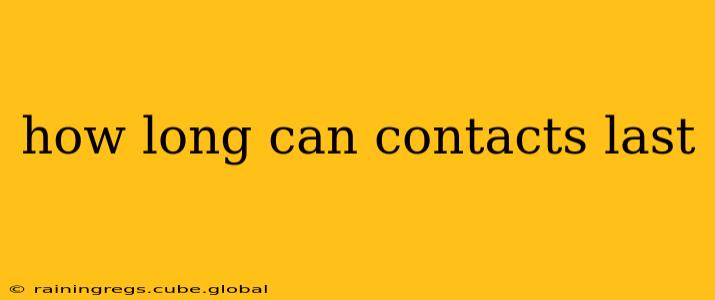Contact lenses, a popular vision correction solution, offer convenience and a natural look. However, understanding their lifespan is crucial for maintaining eye health. The longevity of your contact lenses depends on several factors, and using them beyond their recommended duration can lead to serious eye problems. This comprehensive guide will explore how long different types of contacts last and answer some frequently asked questions.
What Determines Contact Lens Lifespan?
The lifespan of your contact lenses isn't arbitrary; it's determined by the material they're made from and how they're designed to interact with your eyes. There are primarily three types of contact lenses categorized by their replacement schedule:
-
Daily Disposable Contacts: These are designed for single-day use and are discarded after each use. They offer the highest level of hygiene and are generally the most convenient option. Their lifespan is, quite literally, one day.
-
Weekly Disposable Contacts: These lenses are replaced weekly, meaning they can be worn for seven days before disposal. They are a good balance between convenience and cost-effectiveness.
-
Monthly Disposable Contacts: As the name suggests, these contacts are designed for monthly replacement. They are generally the most cost-effective option, but require meticulous cleaning and disinfection daily to prevent infection.
-
Extended Wear Contacts: These are specially designed to be worn overnight for extended periods (often up to 30 days continuously, depending on the specific lens type). These require careful consideration and consultation with your eye doctor due to the higher risk of infection.
How Long Can I Actually Wear My Contacts?
This is a crucial question, and the answer is straightforward: always follow your eye doctor's recommendations and the manufacturer's instructions. Wearing contact lenses beyond their recommended replacement schedule, regardless of type, significantly increases your risk of:
-
Eye Infections: Bacteria and other microorganisms can accumulate on the lenses, leading to infections like keratitis (inflammation of the cornea). This can cause significant eye pain, vision impairment, and even vision loss in severe cases.
-
Corneal Ulcers: These are painful sores on the cornea caused by infection. They can lead to scarring and permanent vision problems.
-
Giant Papillary Conjunctivitis (GPC): This is an allergic reaction that can occur with prolonged contact lens wear, causing discomfort, redness, and blurry vision.
What Happens if I Wear Contacts Too Long?
The consequences of wearing contacts beyond their recommended lifespan can range from mild discomfort to severe complications. You might experience:
- Redness and Irritation: Your eyes might feel itchy, gritty, and generally uncomfortable.
- Blurred Vision: The buildup of debris on the lenses can affect your vision clarity.
- Increased Sensitivity to Light: Inflammation can make your eyes more sensitive to light.
Ignoring these symptoms can lead to more serious issues, necessitating immediate medical attention.
Can I Extend the Life of My Contact Lenses?
No, you should never attempt to extend the lifespan of your contact lenses beyond the manufacturer's recommendations. While seemingly cost-effective, it puts your eye health at significant risk. The materials degrade over time, making them more susceptible to harboring bacteria and increasing the likelihood of infection. Always discard lenses according to the specified replacement schedule.
What if I Lose or Damage a Contact Lens?
If you lose or damage a contact lens before it's time for replacement, avoid wearing the other lens until you get a replacement. Use glasses instead until you can see your eye care professional for new lenses. Never attempt to wear a damaged contact lens.
How Often Should I See My Eye Doctor for Contact Lens Checkups?
Regular checkups with your eye doctor are crucial, even if you're diligently following the replacement schedule. These checkups help monitor your eye health, ensure the proper fit of your lenses, and detect any potential problems early. The frequency of these visits will depend on your individual needs and the type of contact lenses you wear. Your doctor will guide you on the appropriate schedule.
By following these guidelines and prioritizing your eye health, you can enjoy the benefits of contact lenses safely and effectively. Remember, the small cost of replacing your lenses on time is far outweighed by the potential consequences of neglecting proper care and usage.
